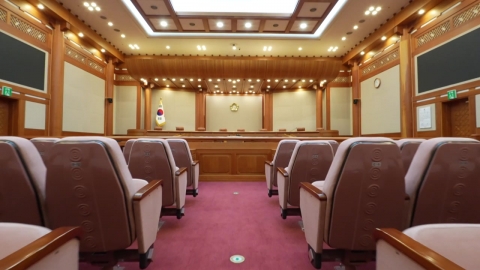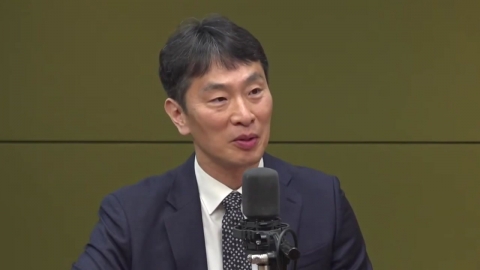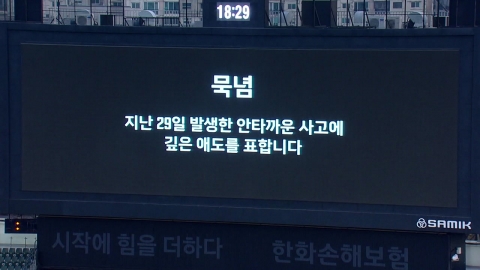-
트럼프, 한국에 25% 상호관세 부과…기본관세 10% 더할 수도재생

- 고삐 풀린 가공식품 물가, 3.6% 상승…"상반기 공공요금 동결"
- 백악관 "상호관세 2일 발표 즉시 발효"…한국 세율 16% 추정
- '30개월 이상 미 소고기·LMO 감자'…관세 폭탄과 함께 오나
-
헌재 선고 후 즉시 효력…윤 대통령 운명의 시나리오재생

- 헌재가 선택할 수 있는 경우의 수 3가지
- 경찰, 선고 D-1 '진공화' 완료…곧 '을호 비상' 발령
- '선고 D-1' 용산 팽팽한 긴장감…인용·복귀 각각 물밑 대비
실시간 이슈
에디터 추천뉴스
-
재생
 단독 강진에 유네스코 세계기록문화유산도 '와르르'…"잠정 관람 중단"
단독 강진에 유네스코 세계기록문화유산도 '와르르'…"잠정 관람 중단" -
재생
 강릉 정박 선박서 '코카인 1.7t'…역대 최대
강릉 정박 선박서 '코카인 1.7t'…역대 최대 -
재생
 8년 만의 탄핵심판…'강골 검사'에서 심판 대상으로
8년 만의 탄핵심판…'강골 검사'에서 심판 대상으로 -
재생
 증인 당황 시킨 송곳 질문…헌재 재판관 '말말말'
증인 당황 시킨 송곳 질문…헌재 재판관 '말말말' -
재생
 비상계엄부터 탄핵심판까지…역사에 기록될 넉 달
비상계엄부터 탄핵심판까지…역사에 기록될 넉 달 -
재생
 20석에 수만 명 몰려…방청 경쟁률 '최고치' 전망
20석에 수만 명 몰려…방청 경쟁률 '최고치' 전망 -
재생
 찬반 집회 총력전…"만장일치 파면" vs "즉각 복귀"
찬반 집회 총력전…"만장일치 파면" vs "즉각 복귀" -
재생
 '상법 개정'에 직 걸었던 이복현 "F4가 말려서 보류"
'상법 개정'에 직 걸었던 이복현 "F4가 말려서 보류" -
재생
 꽃샘추위 넘어 봄 내음 '물씬'…이번 주말 곳곳 벚꽃 행사
꽃샘추위 넘어 봄 내음 '물씬'…이번 주말 곳곳 벚꽃 행사 -
재생
 '묵념과 추모 리본'…사고로 멈췄던 프로야구 차분히 재개
'묵념과 추모 리본'…사고로 멈췄던 프로야구 차분히 재개 -
재생
 '최소 90여 명 매몰' 미얀마 빌라엔 통곡만
'최소 90여 명 매몰' 미얀마 빌라엔 통곡만 -
 "엑스 이용자 2억여 명 이메일 등 개인정보 유출…계정 28억 개"
"엑스 이용자 2억여 명 이메일 등 개인정보 유출…계정 28억 개"
많이 본 뉴스
- 1 쓰레기통서 발견된 1억 2,700만원 '찢긴 수표'...알고 보니
- 2 [속보] 트럼프 "한국 상호관세 25% 부과"
- 3 부산 교육감에 김석준...지자체장 4곳 야당, 1곳 여당
- 4 강릉 정박 선박서 '코카인 1.7t'...역대 최대
- 5 '선고 D-1' 용산 팽팽한 긴장감...인용·복귀 각각 물밑 대비
- 6 [속보] 조국혁신당 정철원, 담양군수 재선거 당선
- 7 "야구장서 팬 숨졌는데..." 창원시가 '빛삭'한 '산불 추모글' [앵커리포트]
- 8 판결로 본 '8인 재판관'...어떤 결정 내려왔나
- 9 중국산 들여와 속여 판 '제이에스티나' 시계...아세톤으로 지운 흔적 [지금이뉴스]
- 10 미 '상호관세' 임박...차·철강 '이중관세' 덮칠까



















